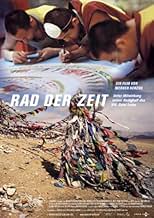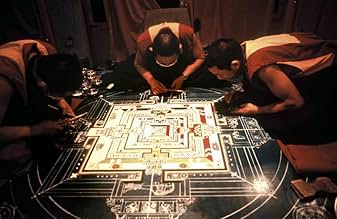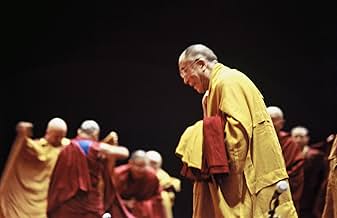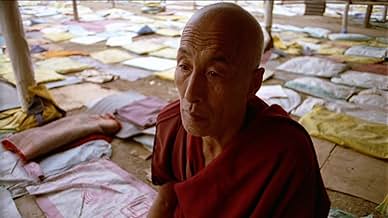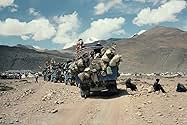IMDb RATING
7.1/10
2.9K
YOUR RATING
Wheel of Time is Werner Herzog's photographed look at the largest Buddhist ritual in Bodh Gaya, India.Wheel of Time is Werner Herzog's photographed look at the largest Buddhist ritual in Bodh Gaya, India.Wheel of Time is Werner Herzog's photographed look at the largest Buddhist ritual in Bodh Gaya, India.
- Director
- Writer
- All cast & crew
- Production, box office & more at IMDbPro
7.12.8K
1
2
3
4
5
6
7
8
9
10
Featured reviews
Perfecting humanity
In 2002 Werner Herzog went to India to observe the festival of Kalachakra, the ritual that takes place every few years to allow Tibetan Buddhist monks to become ordained. An estimated 500,000 Buddhists attended the initiation at Bodh Gaya, the land where the Buddha is believed to have gained enlightenment. The resulting documentary, Wheel of Time, is not a typical Herzog film about manic eccentrics at odds with nature but an often sublime look at an endangered culture whose very way of life is threatened. Herzog admits that he knows little about Buddhism and we do not learn very much about it in the film, yet as we observe the rituals, the celebrations, and the devotion of Tibetan Buddhists we learn much about the richness of their tradition and their strength as a people.
The festival, which lasts ten days, arose out of the desire to create a strong positive bond for inner peace among a large number of people. One notices the almost complete absence of women yet the film ignores it and the narrator makes no comment. The monks begin with chants, music, and mantra recitation to bless the site so that it will be conducive for creating the sand mandala. The magnificently beautiful mandala, which signifies the wheel of time, is carefully constructed at the start of the festival using fourteen different tints of colored sand, then dismantled at the end to dramatize the impermanence of all things. Once built, it is kept in a glass case for the duration of the proceedings so that it will not be disturbed. The most striking aspect of the film are the scenes showing the devotion of the participants.
Using two interpreters, Herzog interviews a monk who took three and one-half years to reach the festival while doing prostrations on the 3000-mile journey. The prostrations, which are similar to bowing and touching the ground, serve as a reminder that we cannot reach enlightenment without first dispelling arrogance and the affliction of pride. In this case, the monk has developed lesions on his hand and a wound on his forehead from touching the earth so many times, yet it hasn't dampened his spirit. Other Buddhists are shown trying to do 100,000 prostrations in six weeks in front of the tree under which the Buddha is supposed to have sat. Herzog introduces a moment of humor when he films a young child imitating the adults by doing his own prostrations but not quite getting the hang of it. In a sequence of rare beauty accompanied by transcendent Tibetan music, we see a Buddhist pilgrimage to worship at the foot of 22,000-foot Mount Kailash, a mountain that is considered in Buddhist and Hindu tradition to be the center of the universe.
The Dalai Lama explains wryly, however, that in reality each of us is truly the center of the universe. After waiting in long lines to witness the Dalai Lama conduct the main ceremony, the crowd is shocked into silence when he tells them that he is too ill to conduct the initiation and will have to wait until the next Kalachakra meeting in Graz, Austria in October. The Graz initiation ceremony is much smaller, however, being confined to a convention hall that can only fit 8000 people; however, everyone is grateful to see the Dalai Lama restored to health. In Austria, Herzog interviews a Tibetan monk who has just been released from a Chinese prison after serving a sentence of thirty-seven years for campaigning for a "Free Tibet". His ecstasy in greeting the Dalai Lama is ineffable. During the closing ceremony, the monks dismantle the Mandala, sweeping up the colored sands and the Dalai Lama releases the mixed sand to the river as a means of extending blessings to the world for peace and healing.
Herzog's mellifluous voice lends a measure of serenity to the proceedings and he seems to be a sympathetic observer. While he makes every effort not to be intrusive, he cannot resist staging a scene toward the end of the film in which a bodyguard is seen presiding over an almost empty convention hall to illustrate the Buddhist concept of emptiness. Wheel of Time may not be Herzog's best work but it does contain moments of grace and images of spectacular beauty. Because of the destruction of their heritage, the Tibetans survive today mainly in the refugee camps of India. Any effort that promotes an understanding of their culture is very welcome and Wheel of Time provides us with an insight into an ancient tradition geared toward perfecting humanity through quieting the mind and cultivating compassion.
The festival, which lasts ten days, arose out of the desire to create a strong positive bond for inner peace among a large number of people. One notices the almost complete absence of women yet the film ignores it and the narrator makes no comment. The monks begin with chants, music, and mantra recitation to bless the site so that it will be conducive for creating the sand mandala. The magnificently beautiful mandala, which signifies the wheel of time, is carefully constructed at the start of the festival using fourteen different tints of colored sand, then dismantled at the end to dramatize the impermanence of all things. Once built, it is kept in a glass case for the duration of the proceedings so that it will not be disturbed. The most striking aspect of the film are the scenes showing the devotion of the participants.
Using two interpreters, Herzog interviews a monk who took three and one-half years to reach the festival while doing prostrations on the 3000-mile journey. The prostrations, which are similar to bowing and touching the ground, serve as a reminder that we cannot reach enlightenment without first dispelling arrogance and the affliction of pride. In this case, the monk has developed lesions on his hand and a wound on his forehead from touching the earth so many times, yet it hasn't dampened his spirit. Other Buddhists are shown trying to do 100,000 prostrations in six weeks in front of the tree under which the Buddha is supposed to have sat. Herzog introduces a moment of humor when he films a young child imitating the adults by doing his own prostrations but not quite getting the hang of it. In a sequence of rare beauty accompanied by transcendent Tibetan music, we see a Buddhist pilgrimage to worship at the foot of 22,000-foot Mount Kailash, a mountain that is considered in Buddhist and Hindu tradition to be the center of the universe.
The Dalai Lama explains wryly, however, that in reality each of us is truly the center of the universe. After waiting in long lines to witness the Dalai Lama conduct the main ceremony, the crowd is shocked into silence when he tells them that he is too ill to conduct the initiation and will have to wait until the next Kalachakra meeting in Graz, Austria in October. The Graz initiation ceremony is much smaller, however, being confined to a convention hall that can only fit 8000 people; however, everyone is grateful to see the Dalai Lama restored to health. In Austria, Herzog interviews a Tibetan monk who has just been released from a Chinese prison after serving a sentence of thirty-seven years for campaigning for a "Free Tibet". His ecstasy in greeting the Dalai Lama is ineffable. During the closing ceremony, the monks dismantle the Mandala, sweeping up the colored sands and the Dalai Lama releases the mixed sand to the river as a means of extending blessings to the world for peace and healing.
Herzog's mellifluous voice lends a measure of serenity to the proceedings and he seems to be a sympathetic observer. While he makes every effort not to be intrusive, he cannot resist staging a scene toward the end of the film in which a bodyguard is seen presiding over an almost empty convention hall to illustrate the Buddhist concept of emptiness. Wheel of Time may not be Herzog's best work but it does contain moments of grace and images of spectacular beauty. Because of the destruction of their heritage, the Tibetans survive today mainly in the refugee camps of India. Any effort that promotes an understanding of their culture is very welcome and Wheel of Time provides us with an insight into an ancient tradition geared toward perfecting humanity through quieting the mind and cultivating compassion.
A good document/meditation on twin Buddhist ceremonies
This is the story of the Buddhist initiation ceremonies held in 2002 in India and in Austria during which elaborate sand mandalas (the Wheel of Time of the title) were created. In India we see how half a million pilgrims come from what ever means was at their disposal to come and see the Dalai Lama and be blessed, while in Austria a few thousand people attended the ceremonies.
Difficult to adequately explain fully, the film, part document of the events, part meditation on them and on larger ideas. It is a film that beautifully shows how one religion can transcend place and time. It attempts to show us the length to which the pilgrims will go in order to travel down the path to enlightenment. Since this is a trip that is only really traveled deep inside oneself Werner Herzog keeps his camera ever moving over the landscape of the people who are trying to find nirvana. We are forever looking at the faces of those deep in prayer and meditation as if we might be able to find some clue as to what is going on deep with in each persons soul. It becomes a mediation on meditation.
For the most part this film works wonderfully. It manages to give some clue into the very nature of what the ceremonies are all about. We are also drawn into a contemplative and meditative state that seems akin or to approximate those of some of the pilgrims. While certainly not the real thing it is enough to give one a feel for deep thought.
I do have one problem with the film, and its a minor one, in the central section the film seems to wander about too much with some of the pilgrims. Its a personal thing but I was not as enthralled with the journey to the sacred mountain, and I did get a bit tired of prostrating monks. Its a minor thing, but it decreased my enjoyment of the film ever so slightly.
Still this is good film that is a must see for anyone who is interested in Buddhism or the varieties of religious experience. For those who want to see a slice of life thats not in their neighborhood, I also recommend it. 7 out of 10 because the reaction to it will as varied as the audience.
Difficult to adequately explain fully, the film, part document of the events, part meditation on them and on larger ideas. It is a film that beautifully shows how one religion can transcend place and time. It attempts to show us the length to which the pilgrims will go in order to travel down the path to enlightenment. Since this is a trip that is only really traveled deep inside oneself Werner Herzog keeps his camera ever moving over the landscape of the people who are trying to find nirvana. We are forever looking at the faces of those deep in prayer and meditation as if we might be able to find some clue as to what is going on deep with in each persons soul. It becomes a mediation on meditation.
For the most part this film works wonderfully. It manages to give some clue into the very nature of what the ceremonies are all about. We are also drawn into a contemplative and meditative state that seems akin or to approximate those of some of the pilgrims. While certainly not the real thing it is enough to give one a feel for deep thought.
I do have one problem with the film, and its a minor one, in the central section the film seems to wander about too much with some of the pilgrims. Its a personal thing but I was not as enthralled with the journey to the sacred mountain, and I did get a bit tired of prostrating monks. Its a minor thing, but it decreased my enjoyment of the film ever so slightly.
Still this is good film that is a must see for anyone who is interested in Buddhism or the varieties of religious experience. For those who want to see a slice of life thats not in their neighborhood, I also recommend it. 7 out of 10 because the reaction to it will as varied as the audience.
One of the great documentaries on the subject of religion.
Werner Herzog's documentaries aren't like the documentaries of anyone else. Perhaps the best documentaries are unique to the people who make them. You can tell a Flaherty from a Wiseman just as you can tell a Maysles Brothers from a Herzog. Werner is interested in extremes, if only the extremes in subject matter. He will go out of his way to show us places and things other film-makers often ignore. "Wheel of Time" is his film about a place and an event not usually seen here in the West.
Its subject is a Buddhist initiation rite performed by His Holiness the Dalai Lama and attended by over half a million pilgrims. It's a ceremony of such complexity that Herzog's capturing of it is something of a miracle in itself and, of course, it is a thing of consumate beauty. This is what religion should be but very seldom is and Herzog is a masterful observer. He also narrates the film, informing us about what is happening when we need to know but most of the time simply showing us events as they unfold. Wonderful cinema and one of Herzog's best films.
Its subject is a Buddhist initiation rite performed by His Holiness the Dalai Lama and attended by over half a million pilgrims. It's a ceremony of such complexity that Herzog's capturing of it is something of a miracle in itself and, of course, it is a thing of consumate beauty. This is what religion should be but very seldom is and Herzog is a masterful observer. He also narrates the film, informing us about what is happening when we need to know but most of the time simply showing us events as they unfold. Wonderful cinema and one of Herzog's best films.
Grand Tertön
Werner Herzog again.
This time he is in his mode of creation more by discovery than invention, and it pays off.
The raw material is striking by itself: vast numbers, ephemeral yearnings, trivial and essential rituals. Devotion in any endeavor is something we are drawn to, and there is plenty for our filmmaker to harvest.
The essential part of this film is Herzog as camera during a gathering in India, where a variety of consecrations are planned. Monks and devotees come, some by difficult and humbling means. 400,000 faces (all attempting calmness) are miraculously organized, assembled to be led by the supreme priest.
We see queues so orderly they could only exist among such beings, but anxious chaos when fighting for tossed goodies: dumplings and candies. We have zealots, order and peace.
Into this sails Herzog. The story is that he had been cajoled into filming the much smaller gathering in Austria. Austria! He was reluctant to do so, and after the film remains firm in his belief that Austrian Buddhists don't make much sense to him. But with this commitment, he traveled to the gathering in a sacred place in India near Nepal.
There he found a focus for his film in one of the rituals. Though it is presented as central to the gathering, it is only so in Herzog's vision. This holds that mysteries can be conveyed visually. The situation needs to support the vision, but the vision is the thing. It is not the symbol, the notation, the token, but the real thing. This is how he thinks of cinema and the way he presents the sand mandala carries this import.
The "Wheel of Time" is one translation of a sand painting made for this type of gathering, as perfected and maintained by one of the groups in Tibet. Mandalas are movies and intended for meditation, as a structure existing between and shared by the mind of insight and the real world of color and structure. There is much to be said of them and cinema, but Herzog only could film this one (and its copy in Austria) as it is being made with colored sand and exhibited as devotees are rushed past it.
He then went to Mount Kailash, Though this is a couple hundred miles away, he merges it seamlessly into the gathering of nearly half a million robed prayers. Here, he is able to make some magnificent images of the mountain, its waterways and the people ritualistically circumnavigating it. This is holiness he understands and the conflation of mountain and mandala works.
As usual, the music adds great power. I believe that henceforth, I will associate that music with this devotion, though there is no relation other than Herzog chose to build his mandala of these sounds, this extract of natural rock and water, and these people. They would not recognize their devotions as shown here. (And some of this is staged.) But for me, it is a window into something more holy than they worship.
Ted's Evaluation -- 3 of 3: Worth watching.
This time he is in his mode of creation more by discovery than invention, and it pays off.
The raw material is striking by itself: vast numbers, ephemeral yearnings, trivial and essential rituals. Devotion in any endeavor is something we are drawn to, and there is plenty for our filmmaker to harvest.
The essential part of this film is Herzog as camera during a gathering in India, where a variety of consecrations are planned. Monks and devotees come, some by difficult and humbling means. 400,000 faces (all attempting calmness) are miraculously organized, assembled to be led by the supreme priest.
We see queues so orderly they could only exist among such beings, but anxious chaos when fighting for tossed goodies: dumplings and candies. We have zealots, order and peace.
Into this sails Herzog. The story is that he had been cajoled into filming the much smaller gathering in Austria. Austria! He was reluctant to do so, and after the film remains firm in his belief that Austrian Buddhists don't make much sense to him. But with this commitment, he traveled to the gathering in a sacred place in India near Nepal.
There he found a focus for his film in one of the rituals. Though it is presented as central to the gathering, it is only so in Herzog's vision. This holds that mysteries can be conveyed visually. The situation needs to support the vision, but the vision is the thing. It is not the symbol, the notation, the token, but the real thing. This is how he thinks of cinema and the way he presents the sand mandala carries this import.
The "Wheel of Time" is one translation of a sand painting made for this type of gathering, as perfected and maintained by one of the groups in Tibet. Mandalas are movies and intended for meditation, as a structure existing between and shared by the mind of insight and the real world of color and structure. There is much to be said of them and cinema, but Herzog only could film this one (and its copy in Austria) as it is being made with colored sand and exhibited as devotees are rushed past it.
He then went to Mount Kailash, Though this is a couple hundred miles away, he merges it seamlessly into the gathering of nearly half a million robed prayers. Here, he is able to make some magnificent images of the mountain, its waterways and the people ritualistically circumnavigating it. This is holiness he understands and the conflation of mountain and mandala works.
As usual, the music adds great power. I believe that henceforth, I will associate that music with this devotion, though there is no relation other than Herzog chose to build his mandala of these sounds, this extract of natural rock and water, and these people. They would not recognize their devotions as shown here. (And some of this is staged.) But for me, it is a window into something more holy than they worship.
Ted's Evaluation -- 3 of 3: Worth watching.
More anthropological than spiritual.
This film is an exploration of several Tibetan Buddhist rituals, and centers around an initiation in India attended by hundreds of thousands of Himalayan devotees, many of whom arrive after punishing pilgrimages that, in one case, took up to three and a half years. As Cinema this film excels. Herzog places himself in the midst of the throng. The faces he captures tell a thousand stories. Yet the actual stories are few and far between. There is a cool detachment in this film that gives it an anthropological feel. Herzog admitted in a live discussion after the screening that he had little familiarization with Buddhism, and reluctantly took this assignment after several requests only after the Dalai Lama himself personally asked him to do it. There is little to be learned here about the ritual itself, as the film focuses mostly on the attendees. Herzog seems uninterested in the meaning behind the sometimes strange-seeming actions of the devoted monks, and focuses instead on observation. While this is a smart approach for a film-maker on one hand, since any attempt to explain this complicated philosophical system would undoubtably fall short, I was left wanting more. If I can make a somewhat strange metaphor: it was like seeing a documentary on the Superbowl, which focused on Americans traveling from all over the country, standing in long lines, paying large sums of money to get in, drinking beer, shouting and cheering at the field, or shouting at television screens, waving strange banners around, and possibly braving rain, snow or blizzard to see it--without ever really going into what football is. Long shots of haggard faces and people doing "the wave" would be compelling to watch, but wouldn't give a true picture of the event. If you're interested in seeing a fly-on-the-wall observation of a very interesting and different aspect of the human experience, this film succeeds. But if you are interested in understanding the Kalachakra ritual, or learning more about Buddhism, then, like me, you'll be left unsatisfied. Perhaps the film is mistitled. The title, "Wheel of Time", somehow promised something different to me. A more apt title would be something like, "Naked Devotion".
Did you know
- Quotes
The Dalai Lama: All religions carry same message. Message of love, compassion, forgiveness, tolerance, contentment, self-discipline. I think we need these qualities, irrespective of whether we are believer or non-believer, because these are the source of a happy life.
- SoundtracksHimal
Performed by Prem Rama Autari
- How long is Wheel of Time?Powered by Alexa
Details
Contribute to this page
Suggest an edit or add missing content

